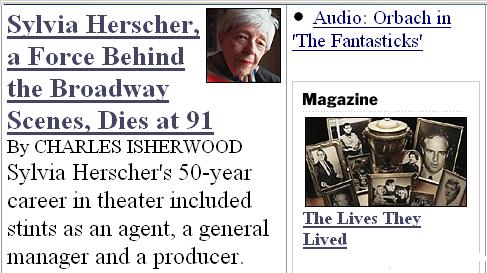Peacemakers
Q: "What have I lived for?"
-- Last words of Larry Hart,
according to
St. Mark's Episcopal Church,
Washington, DC.
From the final New York Times of 2004:
"As the longtime aide-de-camp of the composer and producer Jule Styne,
she assisted in the fabled 1952 rebirth of 'Pal Joey,' easing the
tension between the composer, Richard Rodgers, and the book writer,
John O'Hara."
-- A Force Behind
the Broadway Scenes









Recent Comments